
Cypripedioideae is a subfamily of orchids commonly known as lady's slipper orchids, lady slipper orchids or slipper orchids. Cypripedioideae includes the genera Cypripedium, Mexipedium, Paphiopedilum, Phragmipedium and Selenipedium. They are characterised by the slipper-shaped pouches of the flowers – the pouch traps insects so they are forced to climb up past the staminode, behind which they collect or deposit pollinia, thus fertilizing the flower. There are approximately 165 species in the subfamily.

Paphiopedilum, often called the Venus slipper, is a genus of the lady slipper orchid subfamily Cypripedioideae of the flowering plant family Orchidaceae. The genus comprises some 80 accepted taxa including several natural hybrids. The genus is native to Southeast Asia, the Indian Subcontinent, southern China, New Guinea and the Solomon and Bismarck Islands. The type species of this genus is Paphiopedilum insigne.

Paphiopedilum armeniacum is a species of flowering plant in the orchid family, Orchidaceae. It is known commonly as the apricot orange paphiopedilum and golden slipper orchid. It is endemic to China, where it occurs only in Yunnan. It is also cultivated and has won prestigious awards at flower shows.

Paphiopedilum micranthum, described in 1951, is commonly known as the silver slipper orchid or hard-leaved pocket orchid. It blooms during late winter to early summer with one flower per inflorescence. As opposed to its close sibling Paph. malipoense, the flowers of Paph. micranthum have no fragrance.

Paphiopedilum rothschildianum, it is commonly known as the Gold of Kinabalu orchid or Rothschild's slipper orchid, is a large sized clear-leafed species of orchid. It blooms with a tall inflorescence with up to six, large flowers. It is unique in the Corypetalum group by holding its petals almost horizontally, giving the flower a very distinctive appearance. The peak flowering period is from April to May.

Paphiopedilum glaucophyllum, common name shiny green leaf paphiopedilum or tropical lady's-slipper, is a species of flowering plant in the genus Paphiopedilum of the family Orchidaceae.
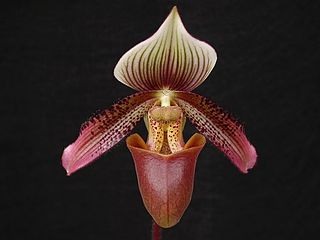
Paphiopedilum ciliolare is a species of flowering plant in the orchid family, Orchidaceae. It is known commonly as the short haired paphiopedilum. It is endemic to the Philippines.

Paphiopedilum dianthum is a species of flowering plant in the orchid family, Orchidaceae. It is native to China, Laos, and Vietnam. It is known commonly as the double flowered paphiopedilum.

Paphiopedilum concolor is a small terrestrial orchid first described in 1865 as Cypripedium concolor. It has dark green and grey-green mottled leaves, up to 150 by 40 mm. Paphiopedilum concolor is native to southern China, Myanmar (Burma), Thailand and Southern and Central Vietnam, usually in Phong Nha-Kẻ Bàng National Park in Quảng Bình Province. They are generally found in lowlands, below 300 m (1,000 ft) elevation, but have been found above 1,000 m (3,300 ft).

Paphiopedilum charlesworthii is a species of plant in the family Orchidaceae.
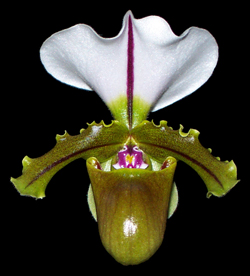
Paphiopedilum spicerianum is a species of flowering plant in the family Orchidaceae. It is said to be endemic to Assam (India) but might actually be rather widespread, though nowhere common, between Bhutan and northwestern Myanmar.

Paphiopedilum callosum is a species of orchid found from Vietnam to northwestern Peninsular Malaysia. It has been investigated and shown promising results in the treatment of cancer.
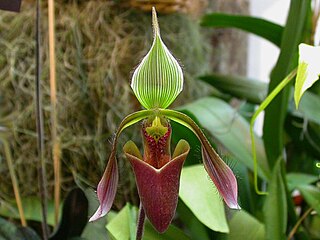
Paphiopedilum dayanum is a species of orchid endemic to Mount Kinabalu on Borneo.

Paphiopedilum fairrieanum is a species of orchid occurring from the eastern Himalaya to Assam.
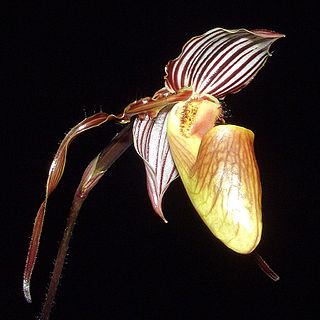
Paphiopedilum glanduliferum is a species of orchid endemic to northwestern New Guinea.

Paphiopedilum haynaldianum is a species of orchid endemic to the islands of Negros and Luzon of the Philippines.

Paphiopedilum hirsutissimum is a species of orchid ranging from Assam to southern China.

Paphiopedilum insigne is an Asian species of slipper orchid and the type species of the genus Paphiopedilum. Its name is derived from the Latin insigne, meaning 'badge of honor' due to the magnificent flower. In the 19th century it was very popular among European and American orchid growers, causing it to become very rare in the wild due to over collecting. There are many varieties of it and hybrids with it.
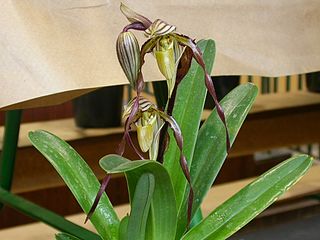
Paphiopedilum philippinense is a species of orchid occurring from the Philippines to northern Borneo.

Paphiopedilum villosum is a species of orchid found Assam, southern China and the Myanmar states of Kachin, Kayar, Shan and the Upper Sagaing region. The population is declining across its range and the species is listed as vulnerable by the IUCN due to habitat degradation and poaching for the global plant trade.





















